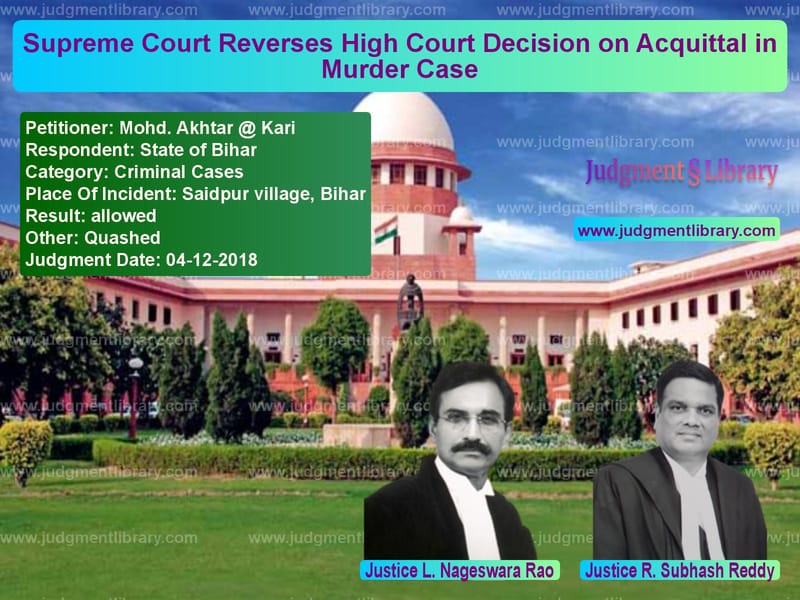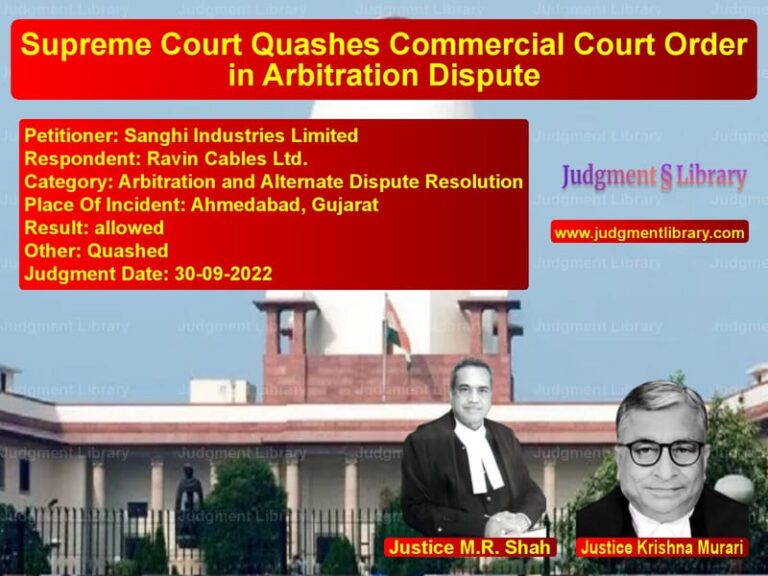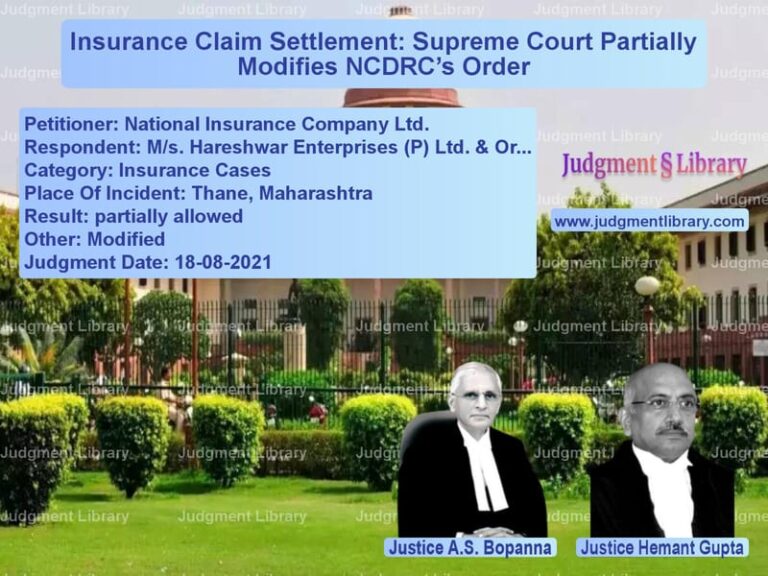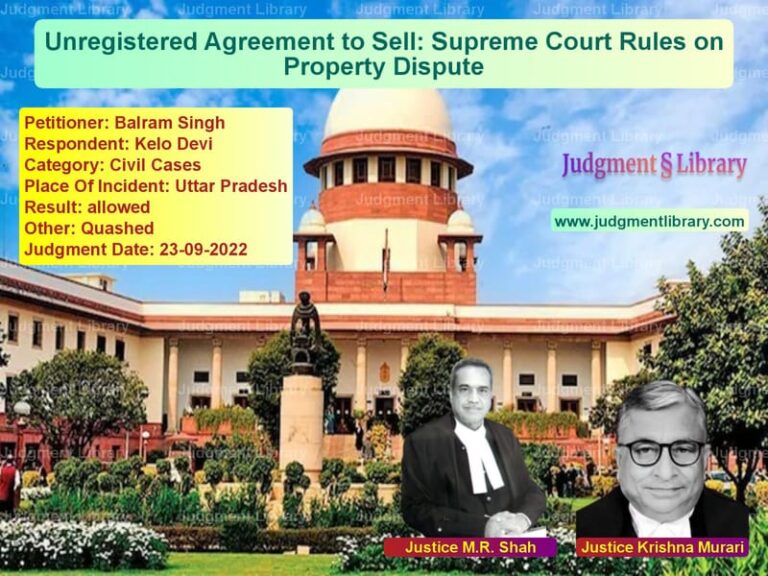Supreme Court Reverses High Court Decision on Acquittal in Murder Case
The case of Mohd. Akhtar @ Kari & Ors. v. State of Bihar & Anr. is a significant ruling in criminal law concerning the appellate court’s power to interfere with a trial court’s acquittal. The Supreme Court was tasked with deciding whether the Bihar High Court had erred in reversing the acquittal of the appellants, who were charged with the murder of Md. Nadir Sah @ Jumma. The appellants had been acquitted by the trial court due to various inconsistencies and contradictions in the prosecution’s case, but the High Court found them guilty and convicted them under sections 302, 148, and 34 of the IPC.
Background of the Case
The incident occurred on January 5, 1984, when Md. Nadir Sah @ Jumma was shot dead by a group of armed assailants in Saidpur village, Bihar. According to the informant, Md. Abu Daud (PW-6), the deceased was ambushed while attempting to collect irrigation dues with his brother. A mob of 10-11 individuals, including the appellants, surrounded and shot the deceased. The prosecution’s case was based on the testimonies of the informant and other eyewitnesses, including PW-3, PW-4, and PW-6.
The trial court, however, acquitted the appellants, finding that the evidence presented by the prosecution was inconsistent, especially regarding the identification of the accused, the delay in filing the FIR, and the absence of independent witnesses. The High Court, after hearing the appeal filed by the State, reversed the trial court’s decision and convicted the appellants, sentencing them to life imprisonment. The appellants challenged the High Court’s decision in the Supreme Court.
Key Issues in the Case
- Whether the High Court was right in reversing the acquittal of the appellants despite the trial court’s findings.
- Whether the evidence presented by the prosecution was sufficient to convict the appellants.
- Whether the principles governing appeals against acquittals were properly applied by the High Court.
Arguments by the Appellant
The appellants, represented by Senior Advocate, contended:
- The trial court’s acquittal was based on sound reasoning, considering the contradictions and inconsistencies in the evidence provided by the prosecution’s eyewitnesses.
- There were significant issues with the identification of the accused, as the eyewitnesses’ testimony regarding the lighting conditions and their ability to identify the appellants was unreliable.
- The delay in filing the FIR and the lack of independent witnesses were key factors that cast doubt on the prosecution’s case.
- The High Court had erred in reappreciating the evidence and substituting its judgment for that of the trial court, which had the advantage of seeing and hearing the witnesses firsthand.
Arguments by the Respondent (State of Bihar)
The State of Bihar, represented by the Public Prosecutor, argued:
- The High Court correctly found the prosecution’s witnesses to be credible, despite minor contradictions, and upheld the conviction.
- The delay in filing the FIR was not fatal to the prosecution’s case, as the informant had provided a plausible explanation for the delay.
- The trial court had misinterpreted the evidence, particularly the identification of the accused, and had erred in its judgment.
- The appellants shared a common intention to kill the deceased, and the evidence was sufficient to convict them under Section 302 of the IPC.
Supreme Court’s Observations
The Supreme Court, after considering the entire evidence on record, made the following key observations:
1. The Role of the Trial Court’s Findings
The Court emphasized that in appeals against acquittals, the findings of the trial court, which had the opportunity to observe the demeanor of the witnesses, should be given due weight. The Court referred to the case of Sheo Swarup v. King-Emperor, where it was established that the appellate court must give proper weight to the trial court’s view on the credibility of witnesses. The Court observed:
“The trial court had the advantage of seeing and hearing the witnesses. The appellate court should be cautious before overturning the trial court’s judgment, particularly when the acquittal is based on reasonable doubt.”
2. The Presumption of Innocence
The Court noted that the presumption of innocence in favor of the appellants is strengthened by the trial court’s acquittal. The Court referred to the principle that an acquittal is not to be disturbed unless there are substantial and compelling reasons for doing so. It stated:
“The acquittal of the appellants is based on a reasonable view of the evidence. The High Court’s interference with the trial court’s judgment was not justified, as the trial court had applied the correct legal principles.”
3. Evaluation of the Evidence
The Court observed that while the High Court had re-evaluated the evidence, it had failed to consider the trial court’s findings regarding the inconsistencies in the eyewitnesses’ testimonies. The Court noted:
“The trial court was right in doubting the credibility of the eyewitnesses based on the improbability of their ability to identify the accused in the light available. There were several contradictions that were not addressed by the High Court.”
Moreover, the Court noted that the non-examination of independent witnesses and the delay in lodging the FIR raised further doubts about the prosecution’s case.
4. The Burden of Proof
The Court reinforced the principle that the prosecution has the burden of proving the case beyond a reasonable doubt. It stated:
“The prosecution has failed to prove the guilt of the appellants beyond a reasonable doubt. The minor inconsistencies and contradictions in the evidence raise doubts about the truthfulness of the witnesses’ statements.”
Supreme Court’s Judgment
The Supreme Court ruled:
- The appeal filed by the appellants was allowed, and the High Court’s decision was set aside.
- The judgment of the trial court, acquitting the appellants, was restored.
- The Court reiterated the importance of respecting the trial court’s findings in appeals against acquittals, particularly in the absence of substantial reasons to overturn those findings.
Impact of the Judgment
This judgment has important implications for the legal system, particularly regarding the review of acquittals in criminal cases:
- Affirmation of Presumption of Innocence: The ruling reaffirms that the presumption of innocence in favor of the accused remains intact even after the trial court’s acquittal.
- Importance of Trial Court’s Findings: The judgment emphasizes that appellate courts must be cautious when reviewing trial court decisions, particularly when the trial court has assessed witness credibility firsthand.
- Standard for Appeals Against Acquittals: The ruling sets a high bar for overturning acquittals, stressing that appeals should be based on substantial and compelling reasons.
Conclusion
The Supreme Court’s ruling in Mohd. Akhtar @ Kari & Ors. v. State of Bihar highlights the need for careful scrutiny of evidence and adherence to legal principles in cases involving appeals against acquittals. By restoring the acquittal of the appellants, the Court reinforced the importance of the presumption of innocence and the trial court’s findings, ensuring that justice is delivered based on a thorough evaluation of the facts. This case will serve as a key reference in the future for appellate courts when reviewing acquittals in criminal cases.
Petitioner Name: Mohd. Akhtar @ Kari.Respondent Name: State of Bihar.Judgment By: Justice L. Nageswara Rao, Justice R. Subhash Reddy.Place Of Incident: Saidpur village, Bihar.Judgment Date: 04-12-2018.
Don’t miss out on the full details! Download the complete judgment in PDF format below and gain valuable insights instantly!
Download Judgment: Mohd. Akhtar @ Kari vs State of Bihar Supreme Court of India Judgment Dated 04-12-2018.pdf
Direct Downlaod Judgment: Direct downlaod this Judgment
See all petitions in Murder Cases
See all petitions in Bail and Anticipatory Bail
See all petitions in Cyber Crimes
See all petitions in Judgment by L. Nageswara Rao
See all petitions in Judgment by R. Subhash Reddy
See all petitions in allowed
See all petitions in Quashed
See all petitions in supreme court of India judgments December 2018
See all petitions in 2018 judgments
See all posts in Criminal Cases Category
See all allowed petitions in Criminal Cases Category
See all Dismissed petitions in Criminal Cases Category
See all partially allowed petitions in Criminal Cases Category







